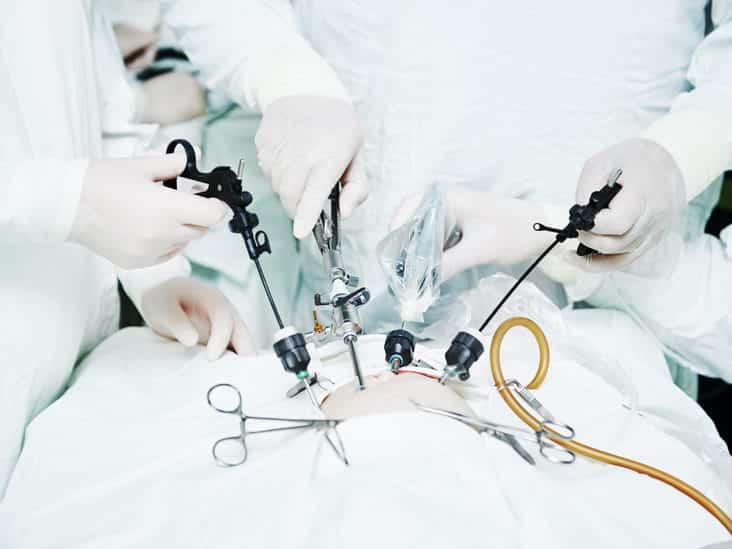How Does a Laparoscopic Gynecological Surgeon Operate?
Catagory: Laparoscopy Author: Dr E Reshma Reddy

A gynecologist who performs procedures using a camera (laparoscope) is known as a gynecological laparoscopic surgeon. A hysteroscope called a laparoscope is placed into the pelvic and abdominal cavities to diagnose different gynecological problems. To ensure that the internal organs are clearly visible when using a laparoscope, carbon dioxide is injected into the cavity in place of a light source. A gynecological laparoscopic surgeon performs this sort of surgery, using a camera that is linked to the tip to take pictures of the organs and record the pictures for different results.
These laparoscopic operations include hysterectomy, tubal ligation, tubal re-anastomosis, and staging of gynecological malignancy. The use of laparoscopy for therapeutic purposes is presently becoming more widespread. The recuperation period is what makes laparoscopy successful. The recovery time is significantly shorter than it would be for other surgeries because this kind of surgery does not require large incisions. A laparoscopy can treat the majority of gynecological disorders, but it is not a cure-all for gynecological issues. Make an appointment with a gynecologist as soon as you can if you want help and answers about your gynecological problems.
In what situations and how can a laparoscopic surgeon assist?
Laparoscopy has changed over the last 50 years from being a restricted gynecological surgical technique used solely for diagnostic and tubal ligations to being a significant surgical instrument utilised for a variety of gynecological and non-gynecological disorders. Laparoscopy has emerged as one of the best alternatives for several surgical operations, including the removal of ectopic pregnancies, treatment of endometriosis, ovarian cystectomy, and laparoscopy. Compared to other abdominal surgeries that require bigger incisions and longer hospital stays, the recovery time is shorter.
In gynecological conditions, laparoscopy has become the most frequently used endoscopic technique for both diagnostic and surgical operations, and its indications are continuously expanding. There is no need to worry before your last treatment and operation since it is a therapy that causes very little pain in the throbbing regions. It is especially important because if the operations are put off, they could end up being a big problem for the woman’s life.
One of the greatest treatments offered by a laparoscopic surgeon, a laparoscopic gynecologist uses laparoscopic procedures to treat a variety of problems and may assist women who are struggling to maintain their quality of life. Diagnostic laparoscopy is a useful technique for gynecological disease diagnosis, particularly infertility, and persistent pelvic discomfort. In Delhi NCR, there are several skilled laparoscopic gynecologists who do many successful operations each day. When performed using laparoscopic techniques, the majority of gynecological treatments are proven to be substantially more efficient and affordable. Not just anyone can perform laparoscopic surgery; this requires professionals. Gynecological problems should always be handled by a gynecologist in order to prevent any serious health difficulties in the future.
Gynecological Laparoscopic Surgeons
Types of laparoscopic procedures and safety measures.
There are additional categories for laparoscopic surgery types. Laparoscopic cholecystectomy, laparoscopic hernia repair, laparoscopic splenectomy, and laparoscopic hepatectomy are just a few of the surgical procedures available. Gynecological laparoscopy specialists are available to do these hard procedures and can help women live better lives by giving them the right care, diagnosis, and precautions ahead of time.
Finding a good gynecologist or laparoscopic surgeon is not a difficult task today because patients are aware of the range of options available for treating gynecological disorders and diseases. However, one must be careful. When choosing a qualified surgeon to treat gynecological illnesses such as irregular bleeding, cervical cancer, breast cancer, pelvic masses, and urinary incontinence, there are several considerations that must be made.
Gynecologists and laparoscopic surgeons use the most up-to-date technology and cutting-edge tools to provide and offer the finest care to their patients. Time spent in the hospital, less discomfort, fewer problems, safety, minimal invasiveness, and quick recovery are all benefits of laparoscopic surgery. When choosing the best surgeon for gynecological disorders, a number of factors should be taken into consideration, including location, cost, experience, accessibility, recommendations, and reviews. When a gynecological problem needs to be fixed, a person should be aware of how sensitive the situation is and only go to a gynecologist who is an expert in this field and can promise them good help and results.
Recent posts
-
How to Choose the Right Maternity Hospital in Tirupati
-
How to Maintain a Healthy Pregnancy: Expert Tips
-
Breaking Taboos: Candid Conversations About Women's Health Issues
-
Expert Answers to Top 5 FAQs about the Female Reproductive Lifecycle
-
Navigating Women's Health: Insights from an Obstetrician and Gynecologist
-
Journey to Motherhood: A Comprehensive Guide to Pregnancy Care
-
Sexual Health and Well-being: Expert Advice from Your Obstetrician and Gynecologist
-
Navigating Menstrual Health: Insights and Tips from Your Gynecologist
-
Self-Examination of Breasts
-
Navigating PCOD A Comprehensive Guide for Indian Women
-
Understanding Vaginal Health A Comprehensive Guide
-
Unmasking the Shadows: Smoking's Impact on Women's Health Explored
-
The Crucial Importance of Sleep for Women's Health
-
Unveiling the Benefits of a Healthy Diet for Women's Health
-
How to Increase Your Chances of a Normal Delivery: A Guide for Expectant Moms
-
Preventing and Treating Pelvic Inflammatory Disease
-
How to Deal with Vaginal Dryness and Discomfort
-
Discover the 8 Most Promising Fertility Treatment Options
-
Understanding Urinary Incontinence and Treatment Options
-
The Causes and Treatments of Polycystic Ovary Syndrome (PCOS)
